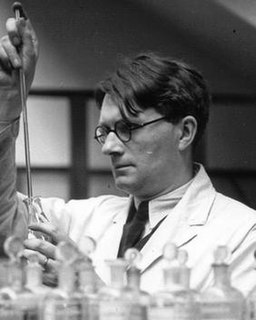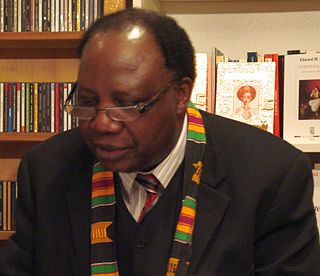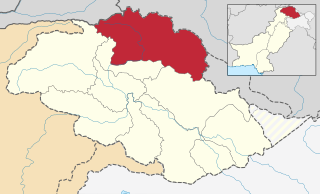
Noel Joseph Terence Montgomery Needham was a British biochemist, historian and sinologist known for his scientific research and writing on the history of Chinese science and technology. He was elected a fellow of the Royal Society in 1941, and a fellow of the British Academy in 1971. In 1992, Queen Elizabeth II conferred on him the Companionship of Honour, and the Royal Society noted he was the only living person to hold these three titles.

Irfan Habib is an Indian historian of ancient and medieval India, following the methodology of Marxist historiography. He identifies as a Marxist and is well known for his strong stance against Hindutva and Muslim communalists. He has authored a number of books, including Agrarian System of Mughal India, 1556–1707.
Ahmad Hassan Dani FRAS, SI, HI was a Pakistani archaeologist, historian, and linguist. He was among the foremost authorities on Central Asian and South Asian archaeology and history. He introduced archaeology as a discipline in higher education in Pakistan and Bangladesh. Throughout his career, Dani held various academic positions and international fellowships, apart from conducting archaeological excavations and research. He is particularly known for archaeological work on pre-Indus Civilization and Gandhara sites in Northern Pakistan.

Cheikh Anta Diop was a Senegalese historian, anthropologist, physicist, and politician who studied the human race's origins and pre-colonial African culture. Though Diop is sometimes referred to as an Afrocentrist, he predates the concept. However, "Diopian thought", as it is called, is paradigmatic to Afrocentricity. His work was greatly controversial and throughout his career, Diop argued that there was a shared cultural continuity across African peoples that was more important than the varied development of different ethnic groups shown by differences among languages and cultures over time.

The Yarkand River is a river in the Xinjiang Uyghur Autonomous Region of western China. It originates in the Rimo Glacier in a part of the Karakoram range and disputed between India, China and Pakistan, and flows into the Tarim River or Neinejoung River, with which it is sometimes identified. However, in modern times, the Yarkand river drains into the Shangyou Reservoir and exhausts its supply without reaching the Tarim river. The Yarkand River is approximately 1,332.25 km (827.82 mi) in length, with an average discharge of 210 m3/s (7,400 cu ft/s).

Kōichirō Matsuura is a Japanese diplomat. He is the former Director-General of UNESCO. He was first elected in 1999 to a six-year term and reelected on 12 October 2005 for four years, following a reform instituted by the 29th session of the General Conference. In November 2009, he was replaced by Irina Bokova.

Amri is an ancient settlement in modern-day Sindh, Pakistan, that goes back to 3600 BCE. The site is located south of Mohenjo Daro on Hyderabad-Dadu Road more than 100 kilometres north of Hyderabad, Pakistan.
Muhammad Rafiq Mugal is a Pakistani archaeologist, engaged in investigating of ethnoarchaeological research in Chitral, northern Pakistan. He has been responsible for the direction, technical support and supervision for restoration and conservation of more than thirty monuments and excavated remains of the Islamic, Buddhist and Proto-historic periods, in Punjab, Khyber-Pakhtunkhwa and Gilgit-Baltistan of Pakistan. He is currently a Professor of Archaeology and Heritage Management and the Director of Undergraduate Studies at Boston University.

Théophile Obenga is professor emeritus in the Africana Studies Center at San Francisco State University. He is a politically active proponent of Pan-Africanism and an Afrocentrist. Obenga is an Egyptologist, linguist, and historian.

Science and Civilisation in China (1954–present) is an ongoing series of books about the history of science and technology in China published by Cambridge University Press. It was initiated and edited by British historian Joseph Needham (1900–1995). Needham was a well-respected scientist before undertaking this encyclopedia and was even responsible for the "S" in UNESCO. To date there have been seven volumes in twenty-seven books. The series was on the Modern Library Board's 100 Best Nonfiction books of the 20th century. Needham's work was the first of its kind to praise Chinese scientific contributions and provide their history and connection to global knowledge in contrast to eurocentric historiography.

Ven. Dr. Tampalawela Dhammaratana, French and Sri Lankan national, was born in Sri Lanka and received his traditional Buddhist education from Sangharaja Pirivena in Kandy and Sunetradevi University College. During his very early education, he had special privilege to study under the guidance of leading traditional Buddhist monastic scholars, in Sri Lanka and he became in proficient in Pali, Sanskrit and Sinhala languages and especially Theravada Buddhism. He received his Buddhist ordination under the instruction of Most Ven. Pitadeniye Sri Ratanapala Sangha Nayake Thera of Uva Wellassa Provinces in Sri Lanka and later he received his Higher Ordination in 1976 at Siam Maha Nikaya, Malwatte Chapter in Kandy, Sri Lanka.

The General History of Africa (GHA) is a two-phase project launched by UNESCO in 1964. The 1964 General Conference of UNESCO, during its 13th Session, instructed the Organization to undertake this initiative after the newly independent African Member States expressed a strong desire to reclaim their cultural identity, to rectify widespread ignorance about their Continent’s history, and to break free of discriminatory prejudices. Phase One, which began in 1964 and was completed in 1999, consisted of writing and publishing eight volumes which highlight the shared heritage of the peoples of Africa. Phase Two, which began in 2009, focuses on the elaboration of history curricula and pedagogical materials for primary and secondary schools on the basis of the eight volumes of the GHA. Phase Two also focuses on the promotion of the use and harmonization of the teaching of this collection in higher education institutions throughout the Continent. Phase Two also concerns the implementation of these materials in schools in Africa and the diaspora. The objective of both Phase One and Phase Two of the project is to re-appropriate the interpretation and writing of African histories and to demonstrate the contribution of African cultures past and present to the history of humanity at large.
The General History of the Caribbean is part of UNESCO’s General and Regional Histories Collection. The publication seeks to contribute to mutual understanding and dialogue between cultures and civilizations. This series seeks to illustrate the encounters between cultures across history and their respective contributions to the general progress of humankind. This is done through the promotion of a pluralist vision of history.
The General History of Latin America is part of UNESCO’s General and Regional Histories Collection. The publication seeks to contribute to mutual understanding and dialogue between cultures and civilizations. This series seeks to illustrate the encounters between cultures across history and their respective contributions to the general progress of humankind. This is done through the promotion of a pluralist vision of history.
Marduk-kabit-aḫḫēšu, "Marduk is the most important among his brothers", c.. 1153–1136 BC, was the founder of the 2nd Dynasty of Isin, which was to rule Babylon until around 1022 BC. He apparently acceded in the aftermath of the Elamite overthrow of the Kassite Dynasty. His name and length of reign are most clearly ascertained from the Babylonian King List C which gives 18 years for his rule.

Nalanda Gedige ; Tamil: நாலந்த கெடிகே) is an ancient complete stone temple near Matale, Sri Lanka and its original site was considered as the center of Sri Lanka. The building was constructed in between 8th and 10th centuries with dravidian architecture in and is believed to have been used by Buddhists. A pillar inscription of the 9-10th century A.D. that was unearthed from the site revealed Nalanda Gedige was a Buddhist monastery. Recorded in the Sinhala language, it includes a code of regulations made for the temple. Also some scholars describe this building is a dravidian architecture dedicated to a Mahayanaa cult with pronounced Trantric learning and known for an ancient monument of possible Vajrayana (Tantric) Buddhist affinities.

Sanghao Cave is a Paleolithic site, located on the Pothohar Plateau of Pakistan that was excavated by Ahmad Hasan Dani.

The Principality of Chaghaniyan, known in Arabic sources as al-Saghaniyan, was a part of the Hephthalite Confederation from the 5th to the 7th century CE. After this, it was ruled by a local, presumably Iranian dynasty, which governed the Chaghaniyan region from the late 7th-century to the early 8th-century CE. These rulers were known by their titles of “Chaghan Khudah”.
Bal Krishen Thapar was an Indian archaeologist who served as the Director-general of the Archaeological Survey of India from 1978 to 1981. He was the founder of INTACH.

The Hunza District is one of the 14 districts of Pakistan-administered territory of Gilgit-Baltistan. It was established in 2015 by the division of the Hunza–Nagar District in accordance with a government decision to establish more administrative units in Gilgit-Baltistan. The district headquarters is the town of Karimabad.















